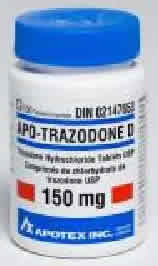Trazodone Side Effects
Summary
The most common side effects of Trazodone may include headache, nausea, vomiting, diarrhea, weakness, weight and appetite fluctuations, nervousness, and dry mouth among others. More serious side effects (often associated with a drug allergy or overdose) include chest pain, hives, pounding heartbeat, difficulty breathing, lack of coordination, or fainting. Some men may experience priapism as a result of taking trazodone.
Common Trazodone Side Effects
The most common side effects of trazodone include the following:
- Nausea and vomiting
- Dry mouth/bad taste in mouth
- Headache
- Stomach and/or muscle pain
- Diarrhea or constipation
- Weakness
- Nervousness and confusion
- Loss of appetite
- Sexual dysfunction
- Nightmares
- Weight fluctuation
- Inability to concentrate
- Sweating
- Blurred vision and/or itchy eyes
Some side effects will lessen over time, but others may persist intermittently throughout the course of treatment. Still, if any of these symptoms worsen or persist to a point of extreme discomfort, patients should contract their physicians.
Serious Trazodone Side Effects
 More serious side effects of trazodone may include:
More serious side effects of trazodone may include:
- Fever
- Difficulty breathing
- Chest pain
- Arrhythmia
- Hives, rash, or itching
- Swelling of the face, throat, legs, or feet
- Loss of consciousness
- Priapism
- Uncontrollable shaking
Any patient experiencing these side effects should seek immediate medical attention.
Men
In some rare cases, men taking trazodone have reported occurrences of priapism. This is often incredibly painful and can cause serious damage to the organ itself, while also putting the individual at risk for long-term sexual dysfunction or impairment (persistent genital arousal disorder).
Cardiac Patients
Those with preexisting heart conditions are more susceptible to more serious side effects of trazodone. For example, patients with a history of heart disease are more prone to experiencing cardiac arrhythmia as a result of taking trazodone. For this reason, it is not recommended for people who have recently suffered a heart attack, and any patient who has suffered from irregular or abnormal heart rate in the past should be closely monitored while taking the drug.
Children
Trazodone has been known to have certain paradoxical effects in children and young adults (24 years old and younger). In other words, rather than decreasing symptoms of depression, in some cases the drug has caused an increase in suicidal thoughts or tendencies, as well as worsened symptoms of depression. In fact, children treated with trazodone may be more likely than those who do not to develop more severe suicidal depression. While the precise risk has not been firmly established, physicians generally do not like to prescribe trazodone to anyone under the age of 18.
Weight Side Effects
Weight gain and weight loss are both possible side effects of trazodone, though they are not among the most commonly reported symptoms of the drug. According to clinical trials, approximately five percent of people taking the drug report weight gain, while six percent report weight loss. Often, weight gain occurs gradually over a long period of time, while weight loss is more immediately symptomatic of the appetite loss, diarrhea, and nausea that are associated with the drug.
Despite its long list of side effects, trazodone is actually one of the safest antidepressants, with fewer severe side effects than others of its class. Pregnant women should avoid trazodone (as there are very few studies on the effects on the fetus), and the drug should be closely monitored in patients with a history of cardiac disease, as well as in children under the age of 18. However, it is FDA approved and can be used to a positive effect in most adults.

